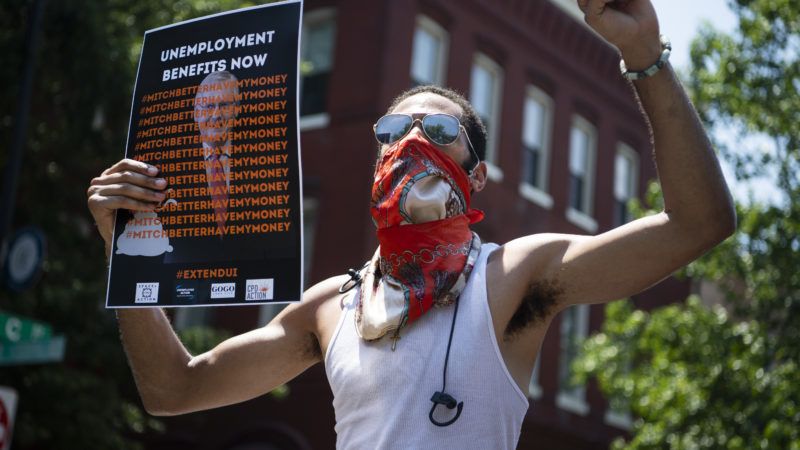'CARES' Package Part Two Is Coming, to the Tune of at Least $1 Trillion
Plus: Gun groups for black Americans are growing, a promising new study on opening schools, and more...

Republicans ready the CARES 2 Act. Republican leaders in the Senate, White House Chief of Staff Mark Meadows, and U.S. Treasury Secretary Steven Mnuchin spent the weekend putting the "finishing touches" on the next round of coronavirus-related spending, Meadows told reporters on Sunday night. Senate Majority Leader Mitch McConnell is slated to introduce it this afternoon.
At a cost of $1 trillion, the new GOP spending package is expected to include checks for all Americans, the continued provision of federal unemployment benefits (albeit at a reduced rate of around $200 per week, down from the current $600), and more Paycheck Protection Program loans, as well as initiatives to reopen schools and to test and trace for COVID-19. It will also include business tax credits.
About $105 billion in spending is slated for schools and $16 billion for test-and-trace efforts, reports ABC News.
The latter program was one of several that divided Republicans:
President Donald Trump had insisted on a payroll tax cut, which caused some delay, but after the pitch met with opposition from many Republicans and Democrats alike, the proposal was dropped. Mnuchin acknowledged over the weekend that the tax incentive did not provide immediate relief, unlike the planned second round of direct payments to Americans with modest incomes. Likewise, the administration caved on an effort to zero out any new funding for testing, tracing, and the major federal health agencies involved in fighting the pandemic.
The bill, being called CARES 2, is an extension of the $2.2 trillion Coronavirus Aid, Relief, and Economic Security (CARES) Act that Congress passed back in March. CARES part one is set to expire on July 31.
For a little bit on how the first round of federal COVID-19 spending has gone in practice, see these past Reason stories:
- "There Is Literally One Guy Overseeing Nearly $500 Billion of Emergency Coronavirus Spending"
- "The Feds Sent More than 1 Million Coronavirus Stimulus Payments to Dead People, GAO Says"
- "Did Trump's Coronavirus Stimulus Save 51 Million Jobs? The Claim Relies on Shaky Math and Questionable Economics."
The Democrat-led House of Representatives passed a follow-up to the CARES Act—called the HEROES Act—back in May, but it hasn't made any leeway in the Republican-controlled Senate.
"It was largely seen as too expensive, costing over $3 trillion," notes Jim Wang at Forbes. "That's a big gap they need to cross during a short window for negotiations."
FREE MINDS
Gun rights groups by and for black Americans appear to be growing in popularity. "Phillip Smith, president of the National African American Gun Owners' Association, said his organization's annual membership has increased by up to 2,000 new members per day—a figure he used to see annually," reports Politico. "His organization has grown to more than 30,000 members this year and has an online following of nearly 90,000 people."
QUICK HITS
NEW from me: For the last decade the Miami-Dade State Attorney's Office has been pushing defendants to donate money to "charities" it created and for which it makes decisions. https://t.co/1Hemm5lAib
— Danny Rivero (@TooMuchMe) July 27, 2020
• Newly released research finds "no measurable difference in the number of coronavirus cases among children in Sweden, where schools were left open, compared with neighboring Finland, where schools were shut."
• More on how mutual aid groups are seeing a big coronavirus-era resurgence.
• It's time to repeal mandatory minimum sentencing laws, in New Jersey and beyond.
Vermin Supreme Institute
We added the word Institute to my name!
We will be instituting stuff.
The 'the' is implied!
(Of something something is also implied!)
Grand Opening this Monday, July 27!!
countdown:
https://t.co/XPKmrZtQHV https://t.co/VvvVoOU6wk
— Vermin Supreme (TM) (@VerminSupreme) July 27, 2020
• "There's a strong case that we have already gotten all the meaningful correlations out of [nutritional epidemiology] databases and continuing to look only makes consumers even more confused [about diet and nutrition] than they already are. It's time to move on," writes Washington Post food columnist Tamar Haspel.


Show Comments (342)